新概念第二册lesson 4 An exciting trip课件(共26张PPT)
文档属性
| 名称 | 新概念第二册lesson 4 An exciting trip课件(共26张PPT) | 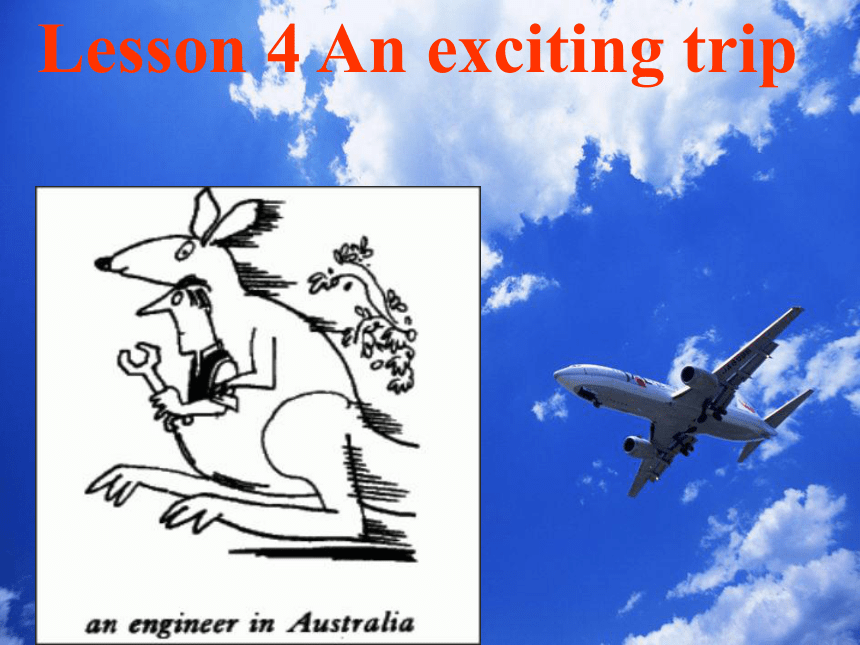 | |
| 格式 | pptx | ||
| 文件大小 | 1.2MB | ||
| 资源类型 | 教案 | ||
| 版本资源 | 新概念英语 | ||
| 科目 | 英语 | ||
| 更新时间 | 2025-01-03 08:53:30 | ||
图片预览

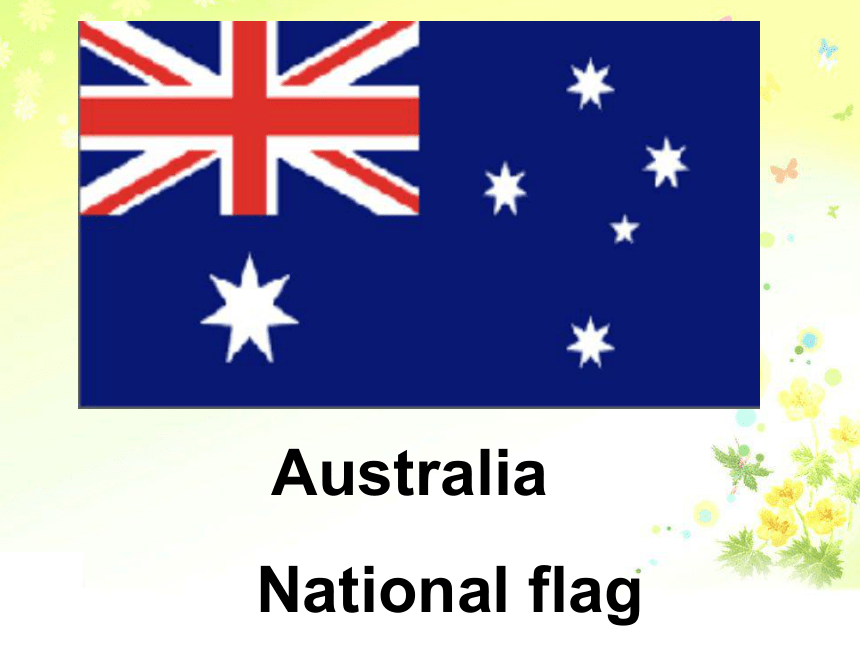
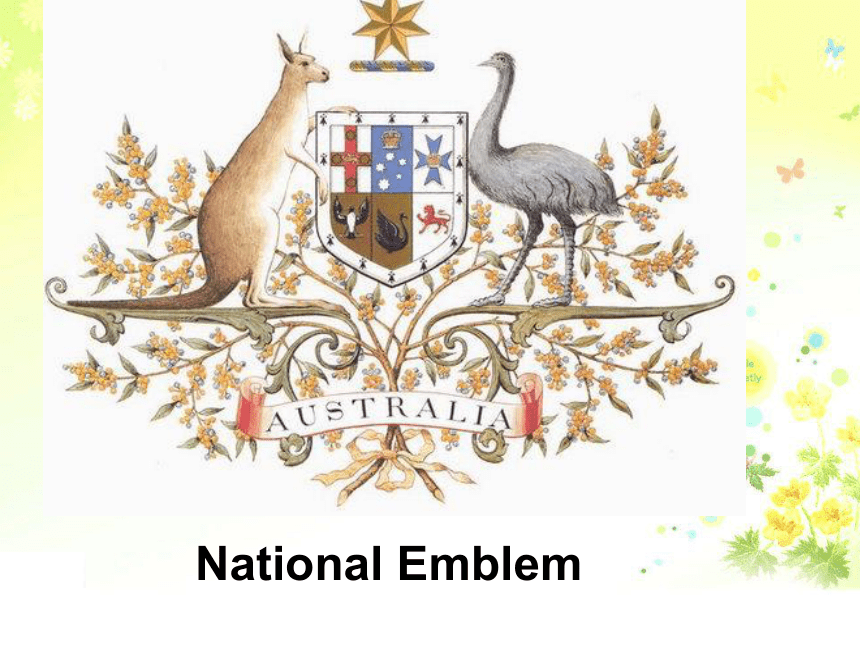
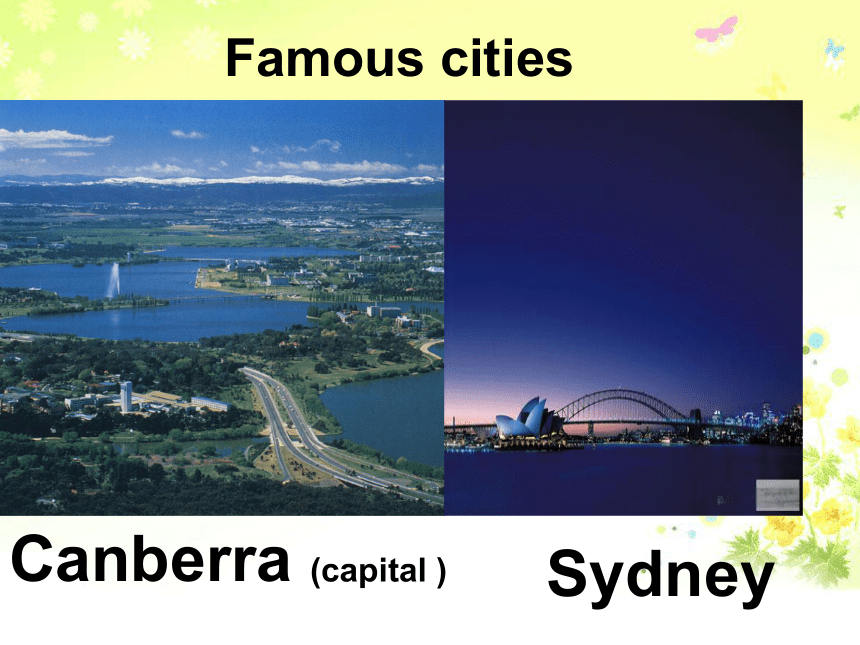


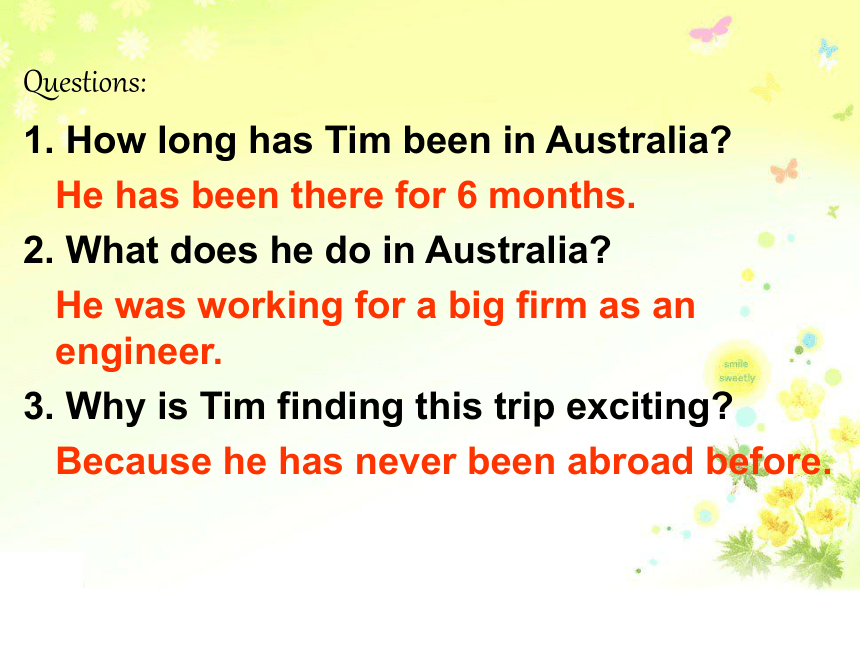

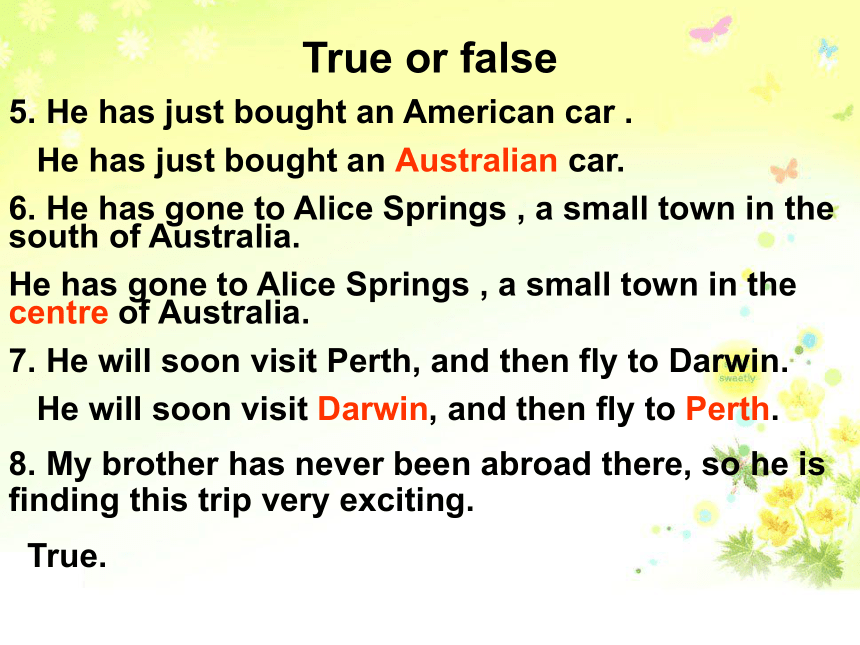
文档简介
(共26张PPT)
Lesson 4 An exciting trip
Australia
National flag
National Emblem
Canberra (capital )
Sydney
Famous cities
koala
Kangaroo
Sydney Opera House
Questions:
1. How long has Tim been in Australia
He has been there for 6 months.
2. What does he do in Australia
He was working for a big firm as an engineer.
3. Why is Tim finding this trip exciting
Because he has never been abroad before.
True or false
I have just received a letter from my sister, Tim.
I have just received a letter from my brother, Tim.
2. He has been there for three months.
He has been there for six months.
3. Tim is a mechanic. He is working for a small firm.
Tim is an engineer. He is working for a big firm.
4. He has already visited a great number of different places in Australia.
True.
True or false
5. He has just bought an American car .
He has just bought an Australian car.
6. He has gone to Alice Springs , a small town in the south of Australia.
He has gone to Alice Springs , a small town in the centre of Australia.
7. He will soon visit Perth, and then fly to Darwin.
He will soon visit Darwin, and then fly to Perth.
8. My brother has never been abroad there, so he is finding this trip very exciting.
True.
I have just received a letter from my brother,
Tim.
receive:收到,接到.
accept:接受.
我收到一份来自陌生人的礼物,但是我没有接受它。
I received a present from a stranger, but I didn’t accept it.
He is in Australia.
He has been there for six months.
Tim is an engineer.
He is working for a big firm and he has
already visited a great number of different
places in Australia.
firm: company.
a great number of + countable nouns
a great number of = a great many
a great amount of+ uncountable nouns
a great amount of money
He has just bought an Australian car and
has gone to Alice Springs, a small town in
the centre of Australia.
centre: n. middle
She lives in the centre of the city.
central: adj.
a city in central Europe
He will soon visit Darwin. From there, he
will fly to Perth.
My brother has never been abroad before,
so he is finding this trip very exciting.
have been to someplace
Have you ever been to Hong Kong
Have you ever been there
have gone to someplace
He has gone to Hong Kong.
He has been to Hong Kong.
1 “have/has gone to
2 have/has been to
3 Have/has been in
(一)三者之间的区别:
1.表示某人已去某地了,不在现场,。(现在在去某地的路上,正在某地,或者在归途中)
2. 表示某人去过某地.(现在人已不在某地了)。
3. 强调某人在某地呆过或呆了一段时间。
(二)三者的常见用法:
have/has gone to+地点
have/has been to+地点+次数
have/has been in+地点
(三)三者的相同点:
当后面跟地点副词(e.g. there)时,介词to 、in 要省略。
go to England
Jim _____ _____ _____ England, he will come back next week.
Jim _____ _____ _____ England many times, he will go there next week again.
England
China
has gone to
has been to
1. I _______ Tibet several times. I like it very much.
A. have gone to B. have been in C. have been to
2. --Where is Jim
-- He _____ Shanghai.
A. has been in B. have been to C. have gone to
3. -- What do you think of Dalian
-- I think it’s very beautiful, but I _______
there.
A. have never been B. have never gone
C. didn’t go
The present perfect tense
现在完成时:表示在过去某一时刻或某一动作之前已经发生的动作或情况
构成形式:have/has + done(past participle)
在过去某一时间前已完成的动作,对现在造成的影响或
产生的结果, 通常与just, already等副词连用
Linda has just/ already finished her homework this morning.
Put the words in the correct
place in each sentence. (Activity 1)
1. They haven’t been to Mars. (yet)
2. Many astronauts have visited the space station. (already)
3.The spacecraft has reached Mars. (just)
4.We’ve known that there isn’t any life
on the moon. (already)
5.We have started to look at other planets. (just)
6.The space shuttle has returned from a
visit to the space station. (just)
They haven’t been to Mars yet.
Many astronauts have already visited the space station.
The spacecraft has just reached Mars.
We’ve already known that there isn’t any life on the moon.
We have just started to look at other
planets.
The space shuttle has already returned from a visit to the space station
The present perfect tense
1.现在完成时:表示在过去某一时刻或某一动作之前已经发生的动作或情况
构成形式:have/has + done(past participle)
2. 从过去发生开始的动作一直持续到现在,很可能将来还会延续,常与for, since, so far, up till now, up to the present day, since 2 weeks ago, since 2000, for…引导的时间短语或从句连用
I have worked here for three years.
I have been here since 2 weeks ago.
Amy: When did you buy it
Bob: I bought it last year.
Bob _______ ______ this television for one year.
has
had
buy
have
borrow
be
keep
become
leave
be away
die
be dead
open
be open
close
be closed
be on
begin
go/come
be in
表示开始于过去并持续到现在的动作或状态,可以和表示从过去某一时刻延续到现在(包括”现在”在 内)的一段时间的状语连用.
for+一段时间
since +时间点
since+一段时间+ago
since+一般过去时的从句
典型句子:It’s +一段时间 +since从句
It’s a long time since he studied English
他好久没学英语了。
主语+
延续性动词
表状态的词
的过去分词
have
has
It’s 20 years since I saw you in 1989.
现在完成时注意四个分清(考点):
1.分清与一般过去时的用法
2.分清终止性动词和延续性动词。
3.分清has been to ,has gone to
4. 分清for, since, ago 的用法
My brother has never been abroad before,
so he is finding this trip very exciting.
abroad: adv.
go abroad
travel abroad
study abroad
live abroad
find + sth. +adj. 觉得…怎么样
Do you find the lesson interesting
I find the film boring .
My brother has never been abroad before,
so he is finding this trip very exciting.
trip : n. (usu short) journey 短距离旅行
祝您旅途愉快!
Have a good trip!
前往巴黎的蜜月旅行
a honeymoon trip to Paris
travel : any journey (the widest usage)
travel agency
Do you go to China during your travels
voyage: by sea
The voyage from Australia to England
journey: a long journey from Paris to Moscow
到意大利的旅行
the journey to Italy
Thank you for your attention!
Tracy
Lesson 4 An exciting trip
Australia
National flag
National Emblem
Canberra (capital )
Sydney
Famous cities
koala
Kangaroo
Sydney Opera House
Questions:
1. How long has Tim been in Australia
He has been there for 6 months.
2. What does he do in Australia
He was working for a big firm as an engineer.
3. Why is Tim finding this trip exciting
Because he has never been abroad before.
True or false
I have just received a letter from my sister, Tim.
I have just received a letter from my brother, Tim.
2. He has been there for three months.
He has been there for six months.
3. Tim is a mechanic. He is working for a small firm.
Tim is an engineer. He is working for a big firm.
4. He has already visited a great number of different places in Australia.
True.
True or false
5. He has just bought an American car .
He has just bought an Australian car.
6. He has gone to Alice Springs , a small town in the south of Australia.
He has gone to Alice Springs , a small town in the centre of Australia.
7. He will soon visit Perth, and then fly to Darwin.
He will soon visit Darwin, and then fly to Perth.
8. My brother has never been abroad there, so he is finding this trip very exciting.
True.
I have just received a letter from my brother,
Tim.
receive:收到,接到.
accept:接受.
我收到一份来自陌生人的礼物,但是我没有接受它。
I received a present from a stranger, but I didn’t accept it.
He is in Australia.
He has been there for six months.
Tim is an engineer.
He is working for a big firm and he has
already visited a great number of different
places in Australia.
firm: company.
a great number of + countable nouns
a great number of = a great many
a great amount of+ uncountable nouns
a great amount of money
He has just bought an Australian car and
has gone to Alice Springs, a small town in
the centre of Australia.
centre: n. middle
She lives in the centre of the city.
central: adj.
a city in central Europe
He will soon visit Darwin. From there, he
will fly to Perth.
My brother has never been abroad before,
so he is finding this trip very exciting.
have been to someplace
Have you ever been to Hong Kong
Have you ever been there
have gone to someplace
He has gone to Hong Kong.
He has been to Hong Kong.
1 “have/has gone to
2 have/has been to
3 Have/has been in
(一)三者之间的区别:
1.表示某人已去某地了,不在现场,。(现在在去某地的路上,正在某地,或者在归途中)
2. 表示某人去过某地.(现在人已不在某地了)。
3. 强调某人在某地呆过或呆了一段时间。
(二)三者的常见用法:
have/has gone to+地点
have/has been to+地点+次数
have/has been in+地点
(三)三者的相同点:
当后面跟地点副词(e.g. there)时,介词to 、in 要省略。
go to England
Jim _____ _____ _____ England, he will come back next week.
Jim _____ _____ _____ England many times, he will go there next week again.
England
China
has gone to
has been to
1. I _______ Tibet several times. I like it very much.
A. have gone to B. have been in C. have been to
2. --Where is Jim
-- He _____ Shanghai.
A. has been in B. have been to C. have gone to
3. -- What do you think of Dalian
-- I think it’s very beautiful, but I _______
there.
A. have never been B. have never gone
C. didn’t go
The present perfect tense
现在完成时:表示在过去某一时刻或某一动作之前已经发生的动作或情况
构成形式:have/has + done(past participle)
在过去某一时间前已完成的动作,对现在造成的影响或
产生的结果, 通常与just, already等副词连用
Linda has just/ already finished her homework this morning.
Put the words in the correct
place in each sentence. (Activity 1)
1. They haven’t been to Mars. (yet)
2. Many astronauts have visited the space station. (already)
3.The spacecraft has reached Mars. (just)
4.We’ve known that there isn’t any life
on the moon. (already)
5.We have started to look at other planets. (just)
6.The space shuttle has returned from a
visit to the space station. (just)
They haven’t been to Mars yet.
Many astronauts have already visited the space station.
The spacecraft has just reached Mars.
We’ve already known that there isn’t any life on the moon.
We have just started to look at other
planets.
The space shuttle has already returned from a visit to the space station
The present perfect tense
1.现在完成时:表示在过去某一时刻或某一动作之前已经发生的动作或情况
构成形式:have/has + done(past participle)
2. 从过去发生开始的动作一直持续到现在,很可能将来还会延续,常与for, since, so far, up till now, up to the present day, since 2 weeks ago, since 2000, for…引导的时间短语或从句连用
I have worked here for three years.
I have been here since 2 weeks ago.
Amy: When did you buy it
Bob: I bought it last year.
Bob _______ ______ this television for one year.
has
had
buy
have
borrow
be
keep
become
leave
be away
die
be dead
open
be open
close
be closed
be on
begin
go/come
be in
表示开始于过去并持续到现在的动作或状态,可以和表示从过去某一时刻延续到现在(包括”现在”在 内)的一段时间的状语连用.
for+一段时间
since +时间点
since+一段时间+ago
since+一般过去时的从句
典型句子:It’s +一段时间 +since从句
It’s a long time since he studied English
他好久没学英语了。
主语+
延续性动词
表状态的词
的过去分词
have
has
It’s 20 years since I saw you in 1989.
现在完成时注意四个分清(考点):
1.分清与一般过去时的用法
2.分清终止性动词和延续性动词。
3.分清has been to ,has gone to
4. 分清for, since, ago 的用法
My brother has never been abroad before,
so he is finding this trip very exciting.
abroad: adv.
go abroad
travel abroad
study abroad
live abroad
find + sth. +adj. 觉得…怎么样
Do you find the lesson interesting
I find the film boring .
My brother has never been abroad before,
so he is finding this trip very exciting.
trip : n. (usu short) journey 短距离旅行
祝您旅途愉快!
Have a good trip!
前往巴黎的蜜月旅行
a honeymoon trip to Paris
travel : any journey (the widest usage)
travel agency
Do you go to China during your travels
voyage: by sea
The voyage from Australia to England
journey: a long journey from Paris to Moscow
到意大利的旅行
the journey to Italy
Thank you for your attention!
Tracy
同课章节目录
